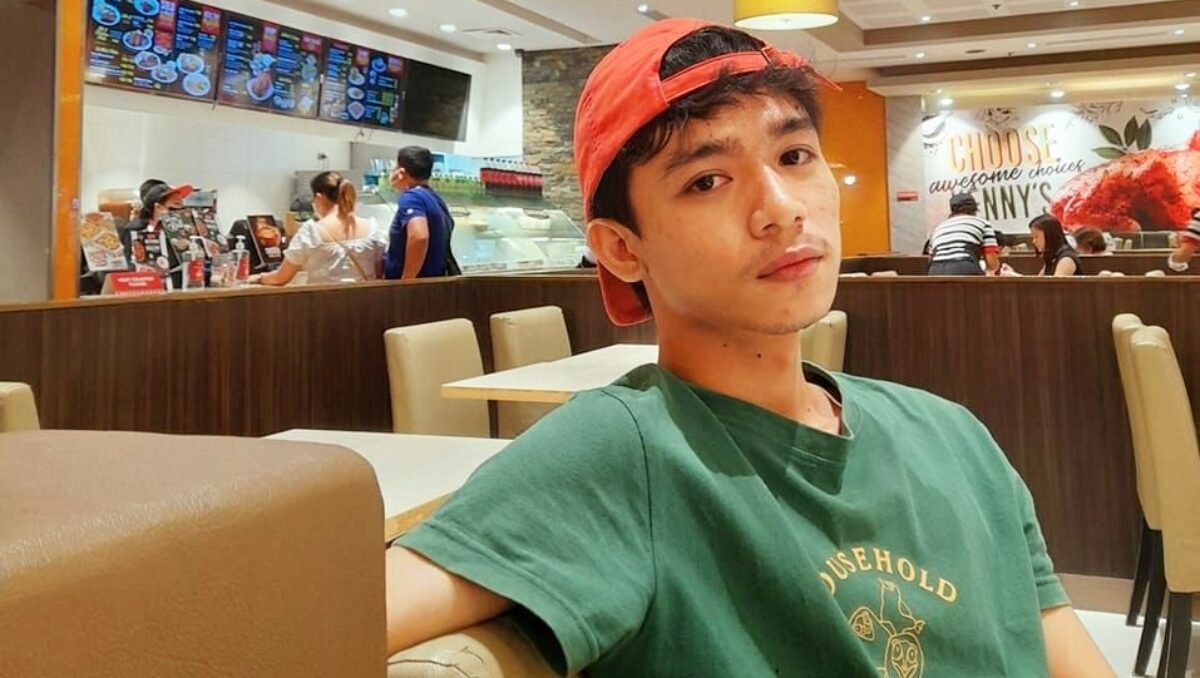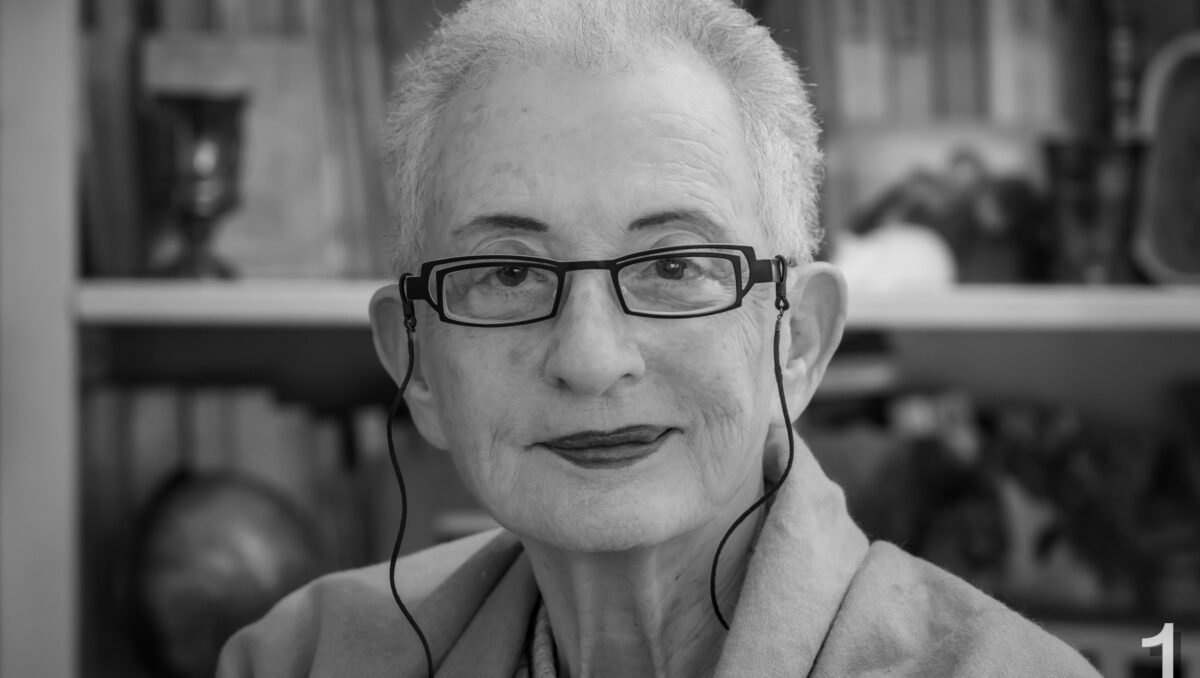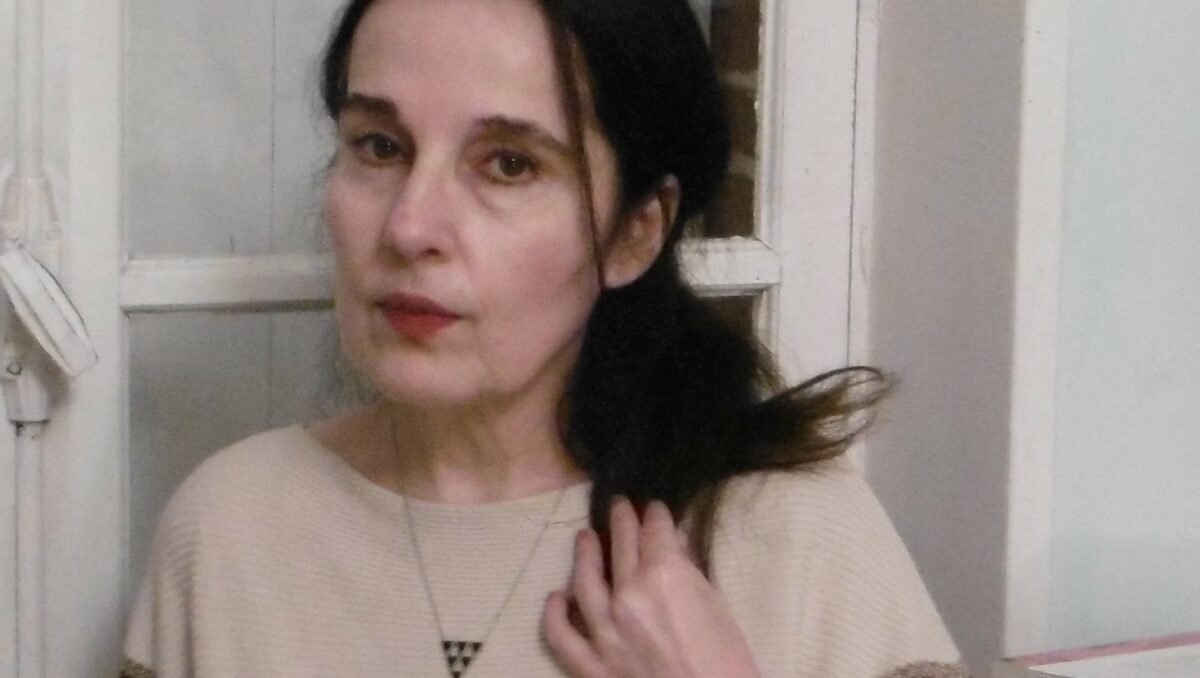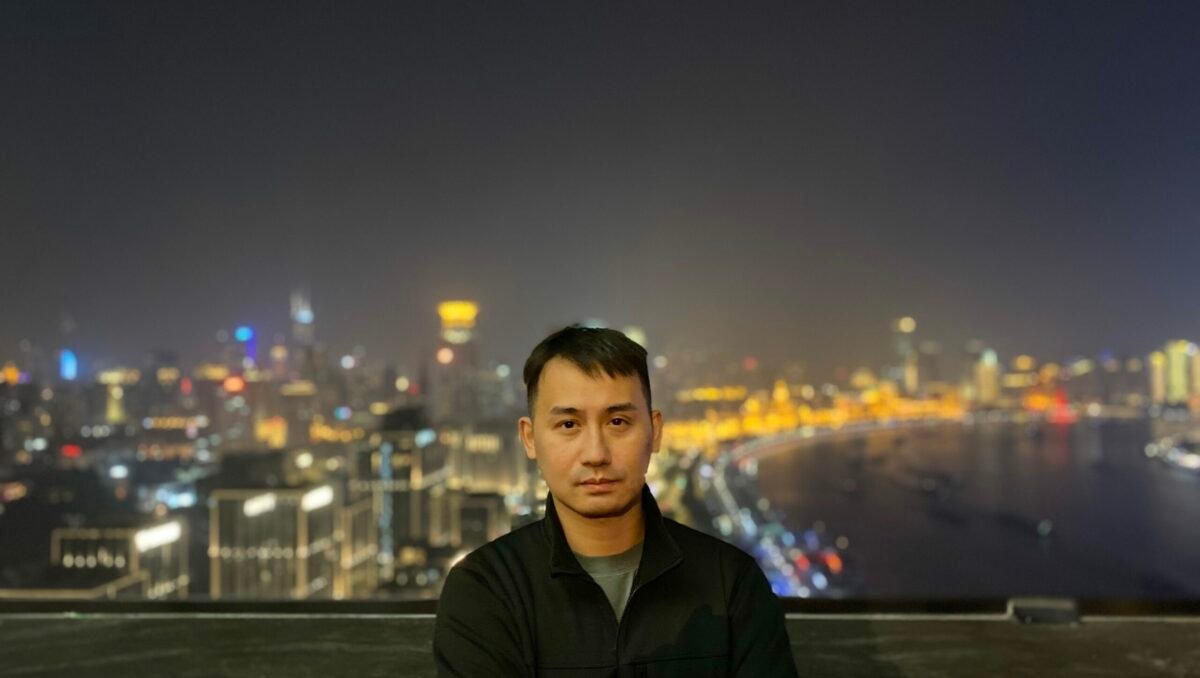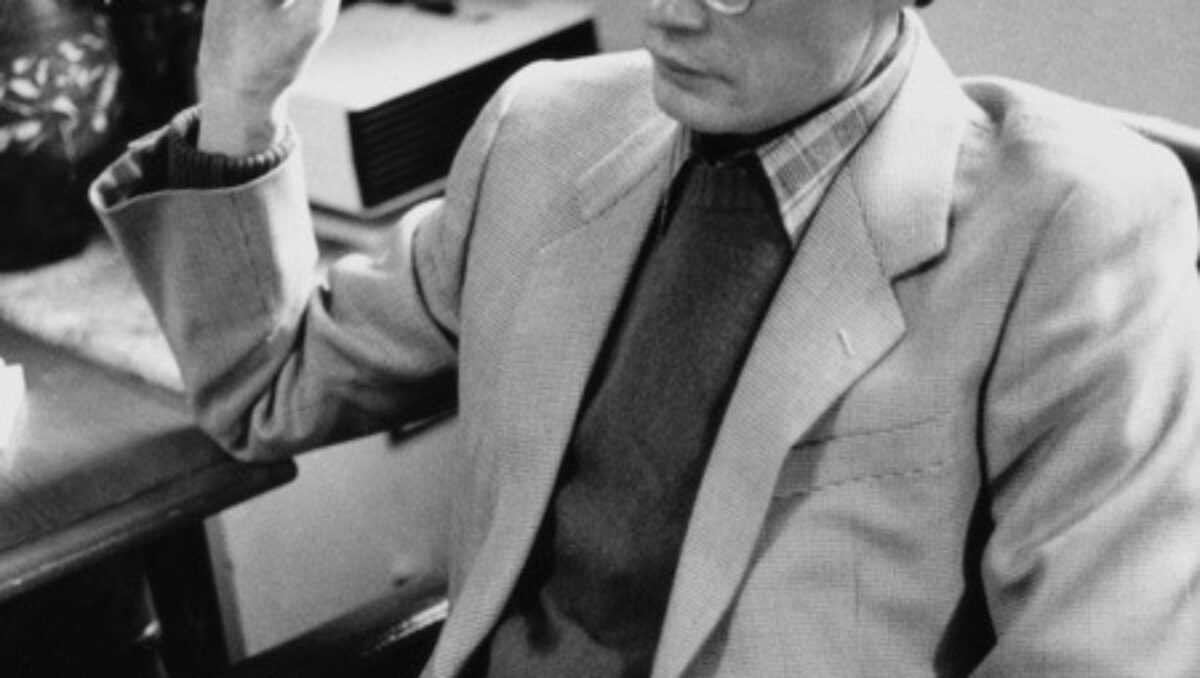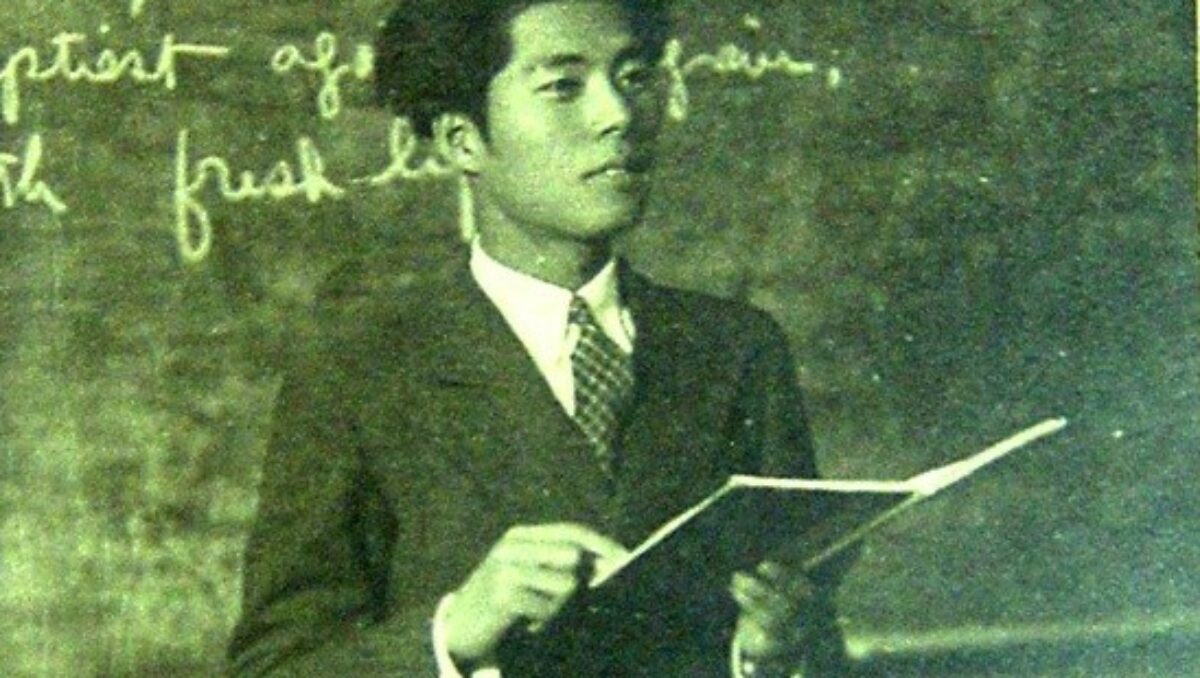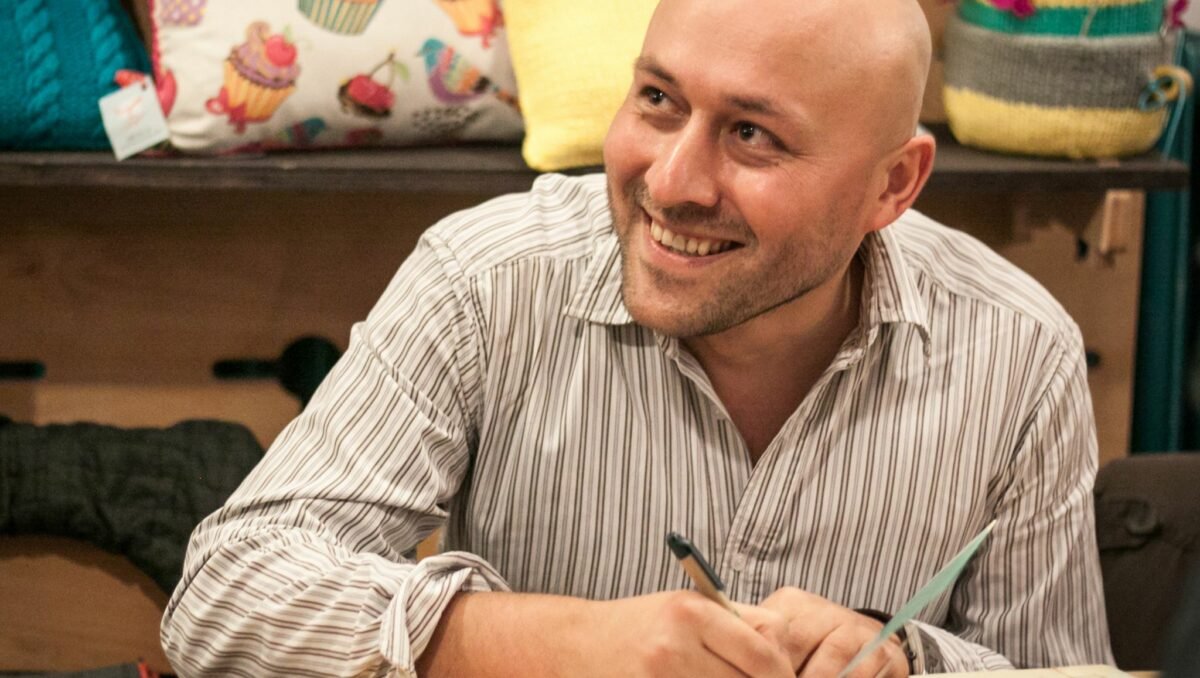THREE POEMS by Anne Vegter trans. Astrid Alben
With permission from the publisher
WILDCARD
A light-hearted lullaby this, not much happens
that doesn’t already happen somewhere else:
a garnet-red baby opens wide its tiny jungle mouth.
Familiar to all who read them, lullabies are
about kisses, jealousies and parents / keepers.
Raging in the pillow, rising like a statue made of ash.
A parent is a house. Gooey goo-goo. Food, milk,
lalala. A lullaby disentangles love.
Be joyous and light touch. Filter light,
the air is of an invaluable purity.
Compared to wellbeing I daresay it’s cloud-cuckoo.
Parents / moods / components of the growth machine:
baby’s first, baby’s own, baby’s living it up. Joyous,
carefree bellowing in a sun-drenched nursery. Done.
Hearts plead, hearts steam: Adonai —
give me back my stalemates, my singular days, my intact membranes.
ISLAND MOUNTAIN GLACIER, PART IV
Even when I, in this minute of my kingdom, in this household of seasons (jan steen), in this
temple (breath), leave it all to you (here sweetie, for you) I elevate your thin meat to a spectacle.
Even when I touch the memory of your hips, your hands tiger my uh-huh parts
ingest me (tongue chest lips) and I read my gape from your lips or should that be gave.
Selections from the Appendix
Appendix
Just like a poem, a translation emerges out of its own possibilities. It is built up of layers, alternate states that enter the work and flow through it. Options, possibilities, stabs, trials and errors, interpretations and choices are made, discarded, brought back, revived, knocked about, improved and transformed.
I got to dissect and study Anne Vegter’s craft as I worked on these translations of her poems. This was a gift. More than a reader, a translator becomes the work’s mechanic. I dismantled each poem, uncovered its particulars, brilliance, magical flurries, flaws, oddities and the syntactical, semantic, sonic, rhythmic bones and muscles that hold it together. On my desk, the poems to be pulled apart, experimented on and reassembled in the new language. Like twins wearing different outfits and sporting different hairstyles, the original and the translation are intimately related yet distinctly separate entities.
Translations are like poems, a work in progress. It is nothing more complicated than that. And then, of course, it is. This appendix shares my process, isolating my choices and keeping the layers of possibility visible for the reader to create their own arrangements and, where necessary, to improve the translations. For I am but one of what I expect will be many more translators bringing Vegter’s writing to an English readership.
Astrid Alben, 2021
TRAMPS
You spoke of an emotional chill, below zero you said it was between
my thighs in the departure lounge. After your bag we hugged heart to heart,
I could’ve joyfully sucked you off. Are you even listening?
We resembled wiry birds; you designed a deathblow on paper,
had yourself a little after-fun with your boredom. It got tricky finding reasons that way.
When the glass slips from your fingers you go find a cure for cracks and salt.
The carpet grins. Will finally someone stand the fuck up and hold me?
TRAMPS
You talked about air temperature, below zero between my legs you said in the
departure lounge. After your bag we hugged each other coeur à coeur,
man I could have blown you I was so happy. Are you still listening.
We reproduced rigid birds, a deathblow’s what you designed on paper
had a little after-fun with your boredom. It became tricky to find reasons that way.
When the glass jolts / jumps / leaps from your finger you look for a cure / remedy against cracks and salt.
The carpet grins. Will finally someone stand the fuck up and hold me.
VAGABONDS
You talked about instinct-heat / emotion-temperature, you found it below zero in the
departure lounge. After your bag we hugged each other coeur à coeur,
happy as a lark ready to blow you. Are you still listening.
We faked / forged / imitated rigid birds, you designed a deathblow / deathly fall on paper
had some after-fun with your boredom. It became tricky to find reasons [in] this way / method / manner.
If the glass leaps from your finger you look for something / a cure against cracks and salt.
The carpet / rug / runner smirks. Will someone stand the fuck up and hold me.
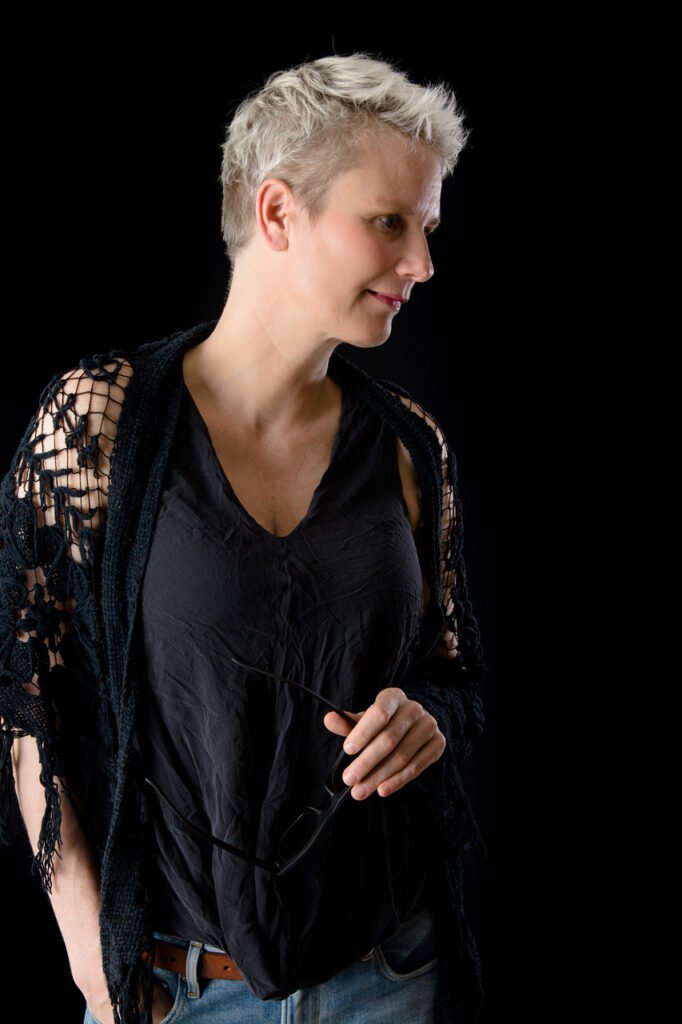
Astrid Alben is a poet, editor and translator. Her most recent collection is Plainspeak (Prototype, 2019) and Little Dead Rabbit (Prototype, 2022).
- Published in ISSUE 26, Poetry, Translation
CHEWING BETEL NUT by Mark Dorado trans. Eric Abalajon and Mark Dorado
This mouth
grows in it a forest
born from the spit
of the gods
of my land;
chews a wildfire
that blackens the stumps of my teeth;
hums the serenade
of our greatest hunters.
This mouth can utter to life
the many names of our ancestors
the conquerors could never
wrap their tongues around,
the ones they spat with regret
as their teeth disintegrated,
choking on the sharp
inflections of the names
of our oceans,
mountains,
warriors.
Oh, to speak
of love and freedom
is cruelty
to a colonizer’s tongue.
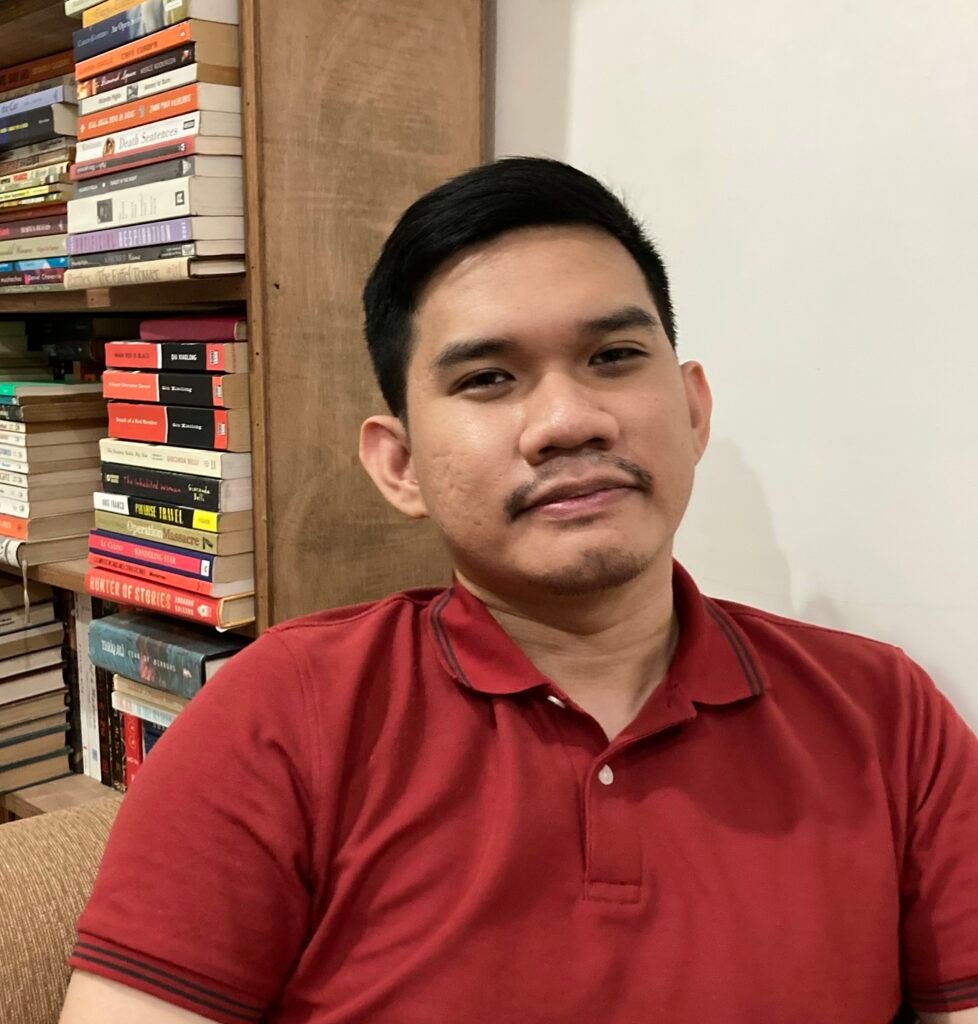
Eric Abalajon is currently a lecturer at the UP Visayas, Iloilo. His works have appeared in Cha: An Asian Literary Journal, The Tiger Moth Review, ANMLY, Modern Poetry in Translation, Asymptote, and Footprints: An Anthology of New Ecopoetry (Broken Sleep Books, 2022). He lives near Iloilo City.
- Published in ISSUE 26, Poetry, Translation
THE GARDEN IS THIS GARDEN by Hélène Cixous trans. Beverley Bie Brahic
|
My days come and go, their almost motionless river is swept with traces, am I in the river’s current or on the edge? I see the shores of Lethe. The river repeats itself unchangingly, on and on, endlessly until we heave ourselves, the river and me, out.
The garden is This Garden. This garden is populated with an indefinite number of presences and visits. Seated on a bench, This Bench, I almost don’t notice a furtive future thought that thinks: I was sitting on This Bench, at the corner of the house where the cat goes out of sight, where Eve my mother, seen only by my hallucinating eye, sits in her usual chair under the strawberry trees.
Memories? No memories, no reproductions of visitors in an album frozen in time but waves, glints of reflections, of instants, bits and pieces, allusions, syllables, sometimes just letters, but capitals, a swarm of winged motes, the dead are not dead, all my old cats go by, hurried thoughts between the paths of present cats, a characteristic of this populace is incessant movement, I do not know what drives them, is it the wind, the spirits, the gods, my beating heart? –No one is dead as long as I am here to greet and traipse after them –Do you remember my sonnet 81? Shakespeare says, the sonnet that has kept me company from May 26, 1954 to this day May 26, 2020, we’ve never been apart, today is the same May 26, between us immortality reigns, a love which does not alter that’s why we are able to remember a sonnet, inscribed in the magic stone of the book: I open Shakespeare and the young sounds of the sonnet prophetic of our mysterious future memories are written on its paper lips. ‘Your monument shall be my gentle verse, / Which eyes not yet created shall o’er-read.’ I have never been able to read these lines in vain, sixty-six months of May readingreading
from ‘Rêvoir’ , translation forthcoming 2024 from Seagull Books. |
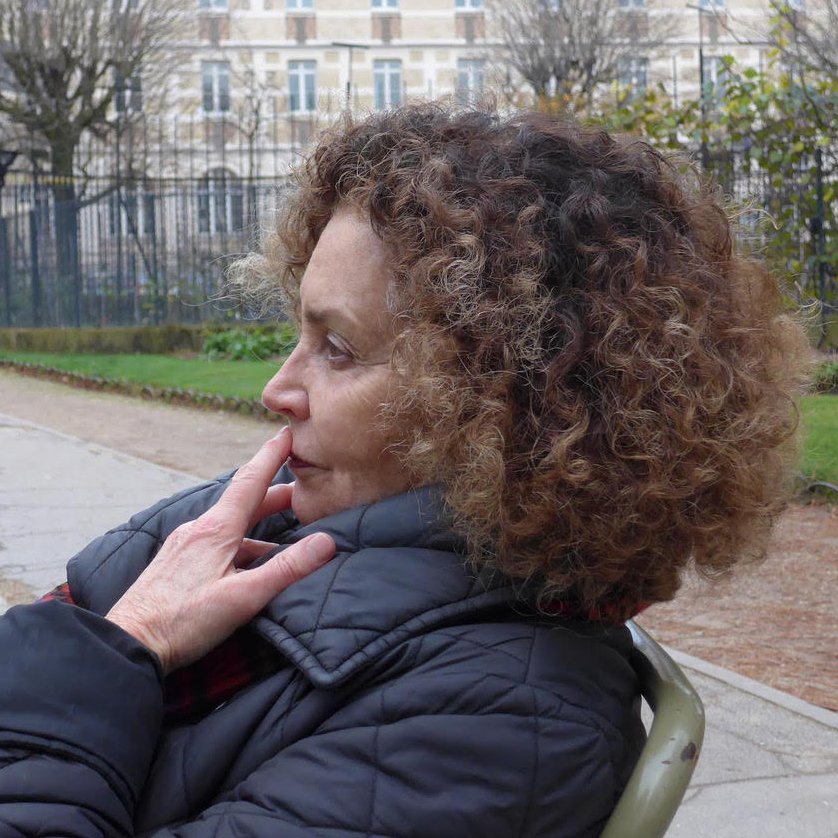
Beverley Bie Brahic is a Paris-based translator and author of four collections of poetry, including the 2012 Forward Prize finalist White Sheets. Her translations include works by Charles Baudelaire, Yves Bonnefoy, Hélène Cixous and Francis Ponge. Guillaume Apollinaire: The Little Auto was awarded the 2013 Scott Moncrieff Translation Prize. (Photo Credit: Michael Brahic)
- Published in ISSUE 26, Poetry, Translation
THREE POEMS by Álvaro Fausto Taruma trans. Grant Schutzman
CEMETERY OF THE DROWNED
To my shipwrecked brothers on the island of Inhaca
As your hymn hangs above the mouth of the castaway I call out your name, I call you with this tongue whose words are more than just a soft murmur, a sob, a liquid wound, a widow’s voice, an estranged orphanhood beyond words. I run the winds of September, the unburied mast of longing, the flower that is your unformed body and I write out the syllables of every tear, here, in this country that you departed and never left. So show me the corolla of waves, the whiteness of a tissue that only you know, an echo, say it to me now. Out here hands dig hollows in the insides of your absence: your mother, my mother, every mother is but one mother when the ship that carries every afternoon returns and an inexplicable rudder leads to a memory of your face. What substance does your body breathe beneath the waters, with what burst of gill? How do you adjust the clearness of the tide, the moss, the plankton, the flora of your exile? Ours is still a body made of flesh, blood and fear and debt growing in unpayable leaps and bounds (and so I write with the fatherland of knees with which one prays, searching for imaginary coins). Tell me of those winds that I have heard only the briefest rustle, of that city where death is a mirror, a spectacle that one paddles across, a shipwrecked dissent. A friend you departed and never were, tell me that the sun will make bloom again the fauna in your eyes (unerasable in the night like in the dreams of fish). Oh, how I too wish for this calmness, your home/ocean where you dream with open arms and set aside the flesh because after all, this is what life is: ephemeral circumstance! So tell me your little lies because here the truth is a revolt held down: fear’s weight on the back of the world, above the books, above the tables worn away by hunger, above the life you chose on that submerged edge of cloud: the stronghold of liquid things.
FACTORY OF SILENT THINGS
Just as the teacher gleans from time his essential tool, I manufacture silence, this loom of words unheard, with the same fire that weaves together the angst of an unfinished life; and yes, from silence we come and to silence we shall return, its fretful whisper soaks my body, and the tree of childhood shadows me with its parched leaves, or the dead landscape of some unnamable season, the September winds sweeping away the summer. Silence, the substance we mine within forgotten verses, how it reminds me of that woman split between farm and phallus, the dewskin above the back of each morning. Like a stone, a graph-paper line, I sharpen silence, I tune silence, and the voices sizzle between its burning blood, calling forth this animal that cannot be slaughtered, the bull slowly chewing its root, I mean, its rage, and they both flow back to its mouth like a blade, a metal whose fire only he knows.
1.
On your back you bear the distance that separates you from your own birth! What voices do you bring, oh recital of time? The flesh burns – animal of space and water – it beheads thirst in public squares of glittering metal. There is no cure for the gangrene in this season of moons and udders, not the blank slate of oblivion, nor the translucent fruit of forgetting. We vibrate in the craters our hearts remake, serpents of wind for hands, gloomy and transfixed, surrendered to Goya’s ashen rifles. Blood condenses where love condemns us – this is the body’s hard burden.
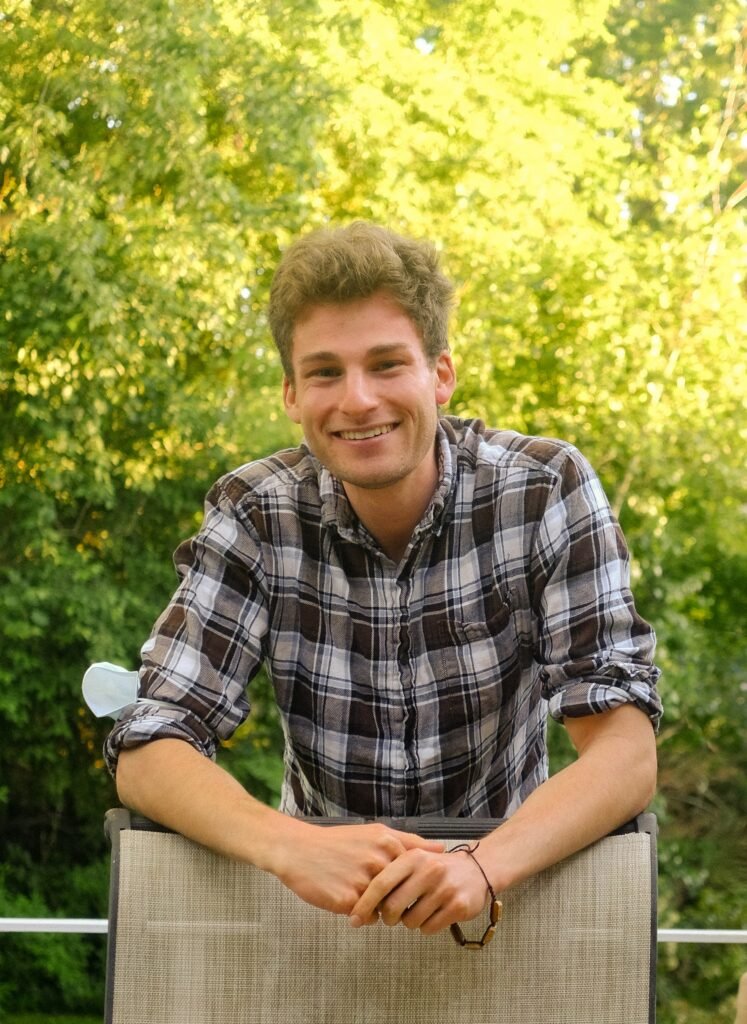
Grant Schutzman is a poet and translator. He is fascinated by multilingual writing and that which has been deemed the untranslateable. His poetry and translations have appeared or are forthcoming in Rust + Moth, The Inflectionist Review, The Shore, Modern Poetry in Translation, Asymptote, The Offing, Your Impossible Voice, and Exchanges.
- Published in ISSUE 26, Poetry, Translation
THROUGH THE LAKE, THROUGH THE WATER by Johannes Anyuru trans. Brad Harmon
THROUGH THE LAKE, THROUGH THE WATER
The beeches stand there, imposing, untouched,
steeped in time: I wander
through the tall yellow hall of leaves
and listen to the open
chords: October, whoever cries here
cries inwards,
the wood bridge has sucked the salve dry.
The underworldly bamboo flutes resound
through the lake, through the water, the wind is
lead poured into stone molds.
I happen to end up
on that strip of beach
where you and I made love one summer day
in the short dry grass.
There’s a you in every poem,
a courage or a great fear, there are
constellations carved out right here,
spokes of blue in the eye of the migratory birds, the words
you laughingly taught me to pronounce.
And the Black Portuguese
spoken in Mozambique
is still the softest language
I know.
To my ears, all your words sound round and powerful,
like our “love”
or “freedom.”
Days when I
stand with my eyes closed
and feel around. As if by a hard
kick, as if by a caress.
Your short, light-blue summer dress
fluttering away through the burning foliage.
The weather changes sex. The dark lake
solidifies.

Brad Harmon is a writer, translator and scholar of Scandinavian and German literature. His work has appeared in journals such as Astra, Chicago Review, Cincinnati Review, Denver Quarterly, Firmament, Plume, and Poetry. In 2021, he was invited to attend the Översättargruvan translation workshop and in 2022, he was an ALTA Emerging Translator fellow. He lives in Baltimore, where he’s a PhD candidate at Johns Hopkins University.
- Published in ISSUE 26, Poetry, Translation
THREE POEMS by Sandra Moussempès trans. Carrie Chappell and Amanda Murphy
NON-IDENTIFIED FEMININE OBJECTS
Cinematic princesses escaping from an Eastward facing convent have long known the limits of where they can go
Fatigued from hours of forest walking, they have taken refuge in a haunted house, abandoned since 1972, they now know that at any moment the story could stop
The film could disintegrate, and they will go back to their well-to-do families in Beverly Hills or to one of the luxurious, seaside subdivisions of Santa Monica
For the moment they chew their wild strawberry bubble gum, listen to Dubstep while wiggling in the bronze corridor, lying on old mattresses spread out over the hard dusty floor
Corn flakes caked on the kitchen table since 1972, the box is draped in spider webs, the advertisements hold the faded colors of the time
We sense something vaporous in the atmosphere, ectoplasms searching for their story, bodies trying to infiltrate other bodies
We do not know what is being woven here, any explanation would be incomplete in light of the breadth of the invisible debates, the voice-overs intermingle:
Where are the memories of which you have no memory?
CINDY SYNDROME (SUPPORT GROUP NEARING EXTINCTION OF VOICES)
Cindy
I’m happy you’ve suggested I be you at first I took it for a vampirization of energy (a modern day masquerade) like an Ali Baba’s cave full of cement receiving its notifications by way of jackhammer but you are not one of those passive aggressive people no one remembers I already possess your voice one day I’ll have access to the kingdom of Olympus through a phonetic wing
Cindy
Her tessitura is currently frozen in the Museum of famous voices after staying in an empty box, a tape recorder from 1972, those machines that look like safes whose inaudible cassettes I’ve kept (I remember the thin magnetic strips I would rewind with my index finger), between the forward and advance buttons we can sense the acceleration of time, “noise reduction” becomes back to the future
Cindy
I presented the thing to myself like that, Cindy spluttering over the translation of another Cindy with a softer voice (Cindy 2 cloned during a marathon of ectoplasms where her paranormal friends met) Cindy in two copies with one small difference that one righter of wrongs and the other ethereal singer had the idea of making a shapeless cake that looked like Cindy 2 we will never know if she force-fed it to disconcerted geese or begged for crumbs of it by the front door
Cindy
It is good to flee condescendence at midnight in glass slippers even if the road is muddy I didn’t force anything side B mixed with precepts and pills from another side A metallic serves as my eyelet lace for king size needles, sewing up an exorcist doll into sound and rags will do
Cindy
Cinderella in her original cardboard box slides up under the fifth wheel of the carriage is upset she mis-steered her project this new definition of the ambiance surrounding the name Cindy amputated by two syllables paper-knife in her mouth reborn before midnight of her cinders is an oracle in immersion please provide the upkeep notice to move up in her heart when the little ghost girl curses the packaging inside herself she must be provided in addition to the survival kit with an expression like on the sly
Cindy
These flowers hung on the back of the waterlily I could plant them out with bluebells my story lends to it half-witch half-sparkling orangeade with a bronze-colored stamp that vacuum-packs you but being there to spread the fire of banalities when poem erupts something other than this other thing that you would like to remember
Cindy
It’s me again too intense before the mirror of dolls drenched with hope they all fit into the frame they search for their reflections in vain we call a princess grown old a queen of carnage well under every relation does not look her age and the mirror turns into a paragraph
WRITING TIME (AND ON THE EXPRESSION “TO TURN THE PAGE”)
Here is the little girl folded over like a page
You open her you undress her you take her with you
You feed her with a fork you slice her
Lengthwise
You entrust her with a page she spreads herself out and wraps herself up with the page
You crush her by closing the book
In theory she is not dead yet she unfolds herself with words
The house of liquid sentences is her main address
A ray of light fastens itself more to the houses/voices than to the invertebrate subjects
Like an eel the little girl lets go of a cry but retrieves it
It’s poetry reduced to black powder then reworked in living dough with a little water
Each pause in a given universe gives off a mystical odor
That we extract without tweezers from a temple above time
I became aware of it – I did not become aware of it –
In sinking my heart like a fork into a fixed memory
In sucking up the features of the guests present during the final scene

Carrie Chappell is the author of Loving Tallulah Bankhead (Paris Heretics 2022) and Quarantine Daybook (Bottlecap Press 2021). Some of her recent individual poems have been published in Iron Horse Literary Review, Nashville Review, Redivider, SWIMM, and Yemassee, and her essays have previously appeared in DIAGRAM, Fanzine, New Delta Review, The Iowa Review, The Rumpus, The Rupture, and Xavier Review. Each spring, she curates Verse of April. She holds an MFA from the University of New Orleans’ Creative Writing Workshop and is Instructor of English at Sorbonne Panthéon University.

Amanda Murphy is an Associate Professor in English and Translation Studies at the Sorbonne Nouvelle University and a translator living in Paris. She holds a PhD in Comparative Literature from the Sorbonne Nouvelle and is a member of the Centre d’Études et de Recherches Comparatistes (CERC). Her doctoral dissertation on multilingual, experimental writing, “Écrire, lire, traduire entre les langues: défis et pratiques de la poétique multilingue”, will be published in 2023 by Classiques Garnier.
- Published in ISSUE 26, Poetry, Translation
ANCIENT MOSQUE by Xiao Shui trans. Judith Huang
Slightly tipsy, walking out of Hongbin Tower. Two hearses appear
on the bike lane. The invisible corpse, shut in a hand-pushed metal box covered
with black brocade, jingles, bangs and clatters, squeezing through the onrush of head-spinning traffic.
Tightly-packed pedestrians scatter loosely in the smog, all eyeing him, intent on helping him find an opening.
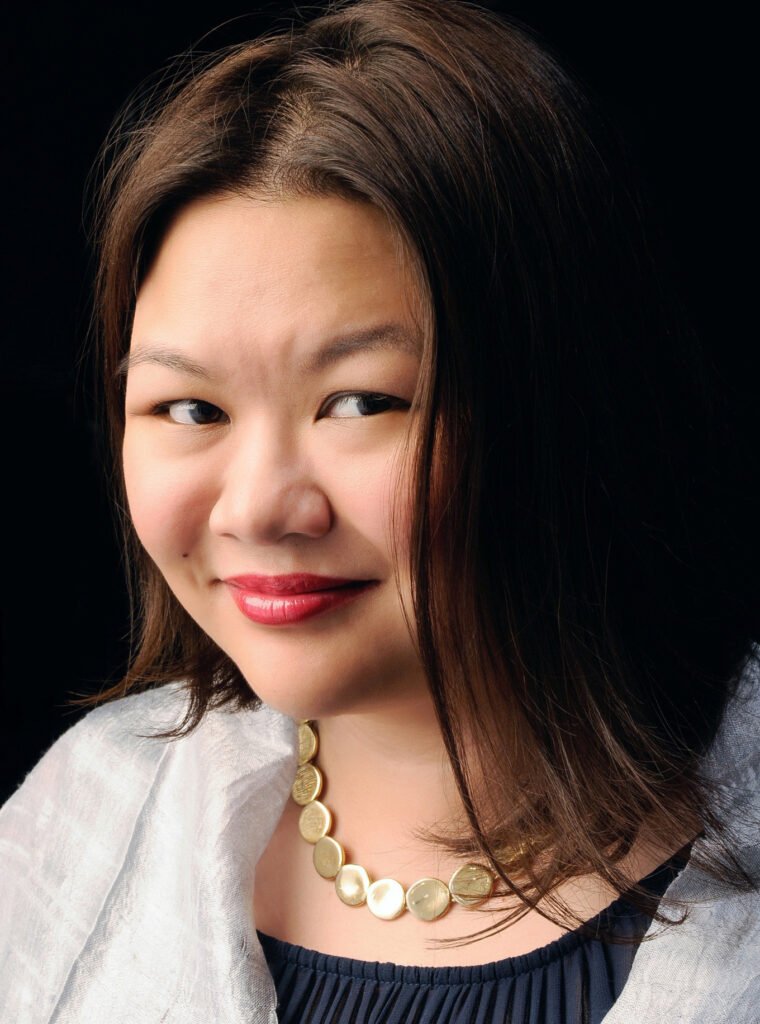
Judith Huang (錫影) is an Australian-based Singaporean author, Rosetta Award-winning translator, musician, serial-arts-collective-founder, Web 1.0 entrepreneur and VR creator. Her first novel, Sofia and the Utopia Machine, shortlisted for the EBFP 2017 and Singapore Book Awards 2019, is the story of a young girl who turns to VR to create her own universe, but when this leads to an actual big bang in the Utopia Machine in a secret government lab, opening portals to the multiverse, she loses everything – and must go on the run with only her wits and her mysterious online friend, “Isaac,” to help her. Can she save her worlds and herself? You can see more of Judith’s work at www.judithhuang.com
- Published in ISSUE 26, Poetry, Translation
TWO POEMS by Ashraf Zaghal trans. Ghada Mourad (from ARABIC)
Halloween
Scene 1
Scarves fly
As if a tribe of ghosts carry them to the sky
They fly and land with sin on my neighbor’s head
My neighbor knows neither their names
Nor hers
Scene 2
Scarves run toward the angels
The angels are unusually black
It’s said to be a costume party
It’s said to be a cheerful consolation
Of the deceased who is in the well
Two ghosts are guarding the well
Scene 3
Shoes are set up on the wall according to the angels’ wishes
“Vanilla scented angels”
Shouts the shoe seller
Who was also selling the prayer to enter the ceremony
Scene 4
Who are you?
Satan said when he saw them coming out of the well
Who are we?
They said
When they slaughtered him
A Poet
When a poet dies
His arm goes to a rose he did not pick
The rose becomes pregnant with a word the poet coveted
Then she throws her newborn in the hand of another poet
When a poet dies
His eyes go to the tattoo of a woman in a remote nightclub
His eyes kiss the tattoo and throw their tears in this woman’s desire
The woman’s desire is now in the eye of another poet
When a poet dies
His head goes to a silver plate in Salome’s hand
Salome covers his head with seven handkerchiefs
And a pain borne by the head of another poet
When a poet dies
His feet go into the house of condolences
He drinks coffee and shakes hands with the mourners
While thinking he is at the funeral of another poet
When a poet dies
His chest goes to a war he much wished for
His chest drinks the stabs like an old wrestler, and he dies often
Because the one who writes his death is another poet
TRANSLATOR BIO:
 Ghada Mourad holds a PhD in comparative literature with emphasis in translation studies from the University of California, Irvine. She translates from Arabic and French into English. Her translations have been published in Asymptote, Banipal, The Literary Review, Metamorphoses, Transference, A Gathering of the Tribes, English Pen, Denver Quarterly, Two Lines, Arablit, among others.
Ghada Mourad holds a PhD in comparative literature with emphasis in translation studies from the University of California, Irvine. She translates from Arabic and French into English. Her translations have been published in Asymptote, Banipal, The Literary Review, Metamorphoses, Transference, A Gathering of the Tribes, English Pen, Denver Quarterly, Two Lines, Arablit, among others.
- Published in ISSUE 25, Translation
WHEN OTHER PEOPLE ARE WRITING POEMS by Oh Kyu-won trans. Jack Jung (from KOREAN)
Sleep does not come for many nights.
Today I waited for my unclosing eyes again
and sleep fell asleep first and sleep’s clothes and shoes
and door talisman went to sleep too
I alone lowered my gaze and watched sleep
who was sleeping without me.
Exhausted sleep collapsed beside me and curled its body
and snored ever so lightly.
Where is my sleep.
My sleep might be shuffling outside my door now and again
before it returns to where it comes from
because I hear crumbling sand.
The fact that I am writing my poems when others are theirs
is really an embarrassment
my jolted poems making strange noises
and sleep will not come. Who sleeps my sleep
who won’t come to me.
Other’s sleep is sleep’s peace and
my sleep is sleep’s death and
other’s sleep is sleep’s dream and
my sleep is sleep’s reality and
my sleep for my sake
cried and cried where did it go.
TRANSLATOR BIO:
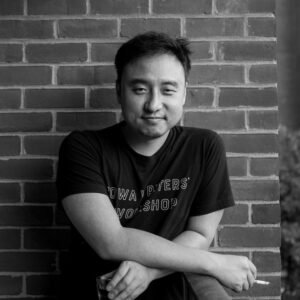 Jack Jung is a graduate of the Iowa Writers’ Workshop, where he was a Truman Capote Fellow. He is a co-translator of Yi Sang: Selected Works (Wave Books 2020), the winner of 2021 MLA Aldo and Jeanne Scaglione Prize for a Translation of Literary Work. He currently teaches at Davidson College.
Jack Jung is a graduate of the Iowa Writers’ Workshop, where he was a Truman Capote Fellow. He is a co-translator of Yi Sang: Selected Works (Wave Books 2020), the winner of 2021 MLA Aldo and Jeanne Scaglione Prize for a Translation of Literary Work. He currently teaches at Davidson College.
- Published in ISSUE 25, Translation
FROM NORTH by Baek Seok trans. Jack Jung (from KOREAN)
Once upon a time I left behind
The tribes of Buyeo and Suksin and Balhae and Yeojin and Yo and Geum
And Heungahnryeong and Eumsan and Amoowooreu and Soonggari
I betrayed the tiger the deer and the raccoon
And lied to the trout the catfish and the frog I left them behind
At the time
remember how the birch and the larch grieved
I have not forgotten the reed and the beewort pleading with me to stay
And how the Orochon tribe hunted a hog and held for me a departing feast
And how the Solon tribe followed me for ten miles and wept I have not forgotten
At the time
No sorrow or grief weighed me down I could beat them
I came lazily to the distant south
And under the warm sun I dressed in white and ate smooth food
And drank sweet spring and took midday naps
At nights I woke surprised by the distant howling of dogs
During days I bowed down to every passing person
But I did not know my shame
During that time the stone was broken and gold and silver were buried beneath earth
The crow too gave birth to a long line of lineage
And after all this when a new day rose once upon a time
I was chased down by sorrow and grief that I truly could not beat
And I returned to the old sky the land – back to my placenta
But now the sun is old the moon is pale the wind is insane a wedge cloud
Alone soullessly floats around
O my ancestors my brothers my family my sweet neighbors my longing
My love my worship my pride my strength are no more
They have passed together with the winds and the waters and the years they are gone
TRANSLATOR BIO:
 Jack Jung is a graduate of the Iowa Writers’ Workshop, where he was a Truman Capote Fellow. He is a co-translator of Yi Sang: Selected Works (Wave Books 2020), the winner of 2021 MLA Aldo and Jeanne Scaglione Prize for a Translation of Literary Work. He currently teaches at Davidson College.
Jack Jung is a graduate of the Iowa Writers’ Workshop, where he was a Truman Capote Fellow. He is a co-translator of Yi Sang: Selected Works (Wave Books 2020), the winner of 2021 MLA Aldo and Jeanne Scaglione Prize for a Translation of Literary Work. He currently teaches at Davidson College.
- Published in ISSUE 25, Translation
[UNTITLED] by Vladislav Hristov trans. Katerina Stoykova (from BULGARIAN)
the mobilizing of the troops
coincided with the amassing
of numerous migrating birds
only magpies crows and vultures
will winter here
sparrows titmouses finches
and the rest of the feathered ones
will seek the path to their salvation
some will become too attached to people
others will live in holes and shelters
in both cases
nobody again will call them
birds
TRANSLATOR BIO:
 Katerina Stoykova is the author of several award-winning poetry books in English and Bulgarian, as well as the Senior Editor of Accents Publishing. Her latest book, Second Skin (ICU, 2018, Bulgarian) received the Vanya Konstantinova biannual national poetry award, as well as a grant from the European Commission’s program Creative Europe for translation and publication in English. Katerina acted in the lead roles for the independent feature films Proud Citizen and Fort Maria, both directed by Thom Southerland. Her poems have been translated into German, Spanish, Ukrainian, Bangla, Farsi, and a volume of her selected poems, translated into Arabic by acclaimed poet Khairi Hamdan, was published in Arabic from Dar Al Biruni press in 2022.
Katerina Stoykova is the author of several award-winning poetry books in English and Bulgarian, as well as the Senior Editor of Accents Publishing. Her latest book, Second Skin (ICU, 2018, Bulgarian) received the Vanya Konstantinova biannual national poetry award, as well as a grant from the European Commission’s program Creative Europe for translation and publication in English. Katerina acted in the lead roles for the independent feature films Proud Citizen and Fort Maria, both directed by Thom Southerland. Her poems have been translated into German, Spanish, Ukrainian, Bangla, Farsi, and a volume of her selected poems, translated into Arabic by acclaimed poet Khairi Hamdan, was published in Arabic from Dar Al Biruni press in 2022.
- Published in ISSUE 25, Translation
from HOW DARK MY SKIN IS LEFT BY HER SHADOW by Beatriz Miralles de Imperial trans. Layla Benitez-James (from SPANISH)
a poem
where I shatter self
where I say no
*
no:
no offering
no trembling
no hands
no thirst
no telling
now more
*
no
no longer
this broken language
*
empty of you
these hands
dry pail
*
I am a silent river
for her to pass through
and unknow her skin
on the water’s skin
her body inscribed onto mine
*
you’ve left no space for your absence
in these hands
nothing survives you
TRANSLATOR BIO:
 Layla Benitez-James is a 2022 NEA fellow in translation, a 2022/23 National Book Critics Circle Fellow, and the author of God Suspected My Heart Was a Geode but He Had to Make Sure, selected by Major Jackson for Cave Canem’s 2017 Toi Derricotte & Cornelius Eady Chapbook Prize. As Director of Literary Outreach for the Unamuno Author Series in Madrid, she edited its poetry festival anthology, Desperate Literature. Poems and essays are published in Modern Poetry in Translation, Black Femme Collective, Virginia Quarterly Review, Latino Book Review, Poetry London, and forthcoming in Poetry Magazine. Layla received an MFA in poetry from the University of Houston and has published reviews with Poetry Foundation’s Harriet Books.
Layla Benitez-James is a 2022 NEA fellow in translation, a 2022/23 National Book Critics Circle Fellow, and the author of God Suspected My Heart Was a Geode but He Had to Make Sure, selected by Major Jackson for Cave Canem’s 2017 Toi Derricotte & Cornelius Eady Chapbook Prize. As Director of Literary Outreach for the Unamuno Author Series in Madrid, she edited its poetry festival anthology, Desperate Literature. Poems and essays are published in Modern Poetry in Translation, Black Femme Collective, Virginia Quarterly Review, Latino Book Review, Poetry London, and forthcoming in Poetry Magazine. Layla received an MFA in poetry from the University of Houston and has published reviews with Poetry Foundation’s Harriet Books.
- Published in ISSUE 25, Translation

